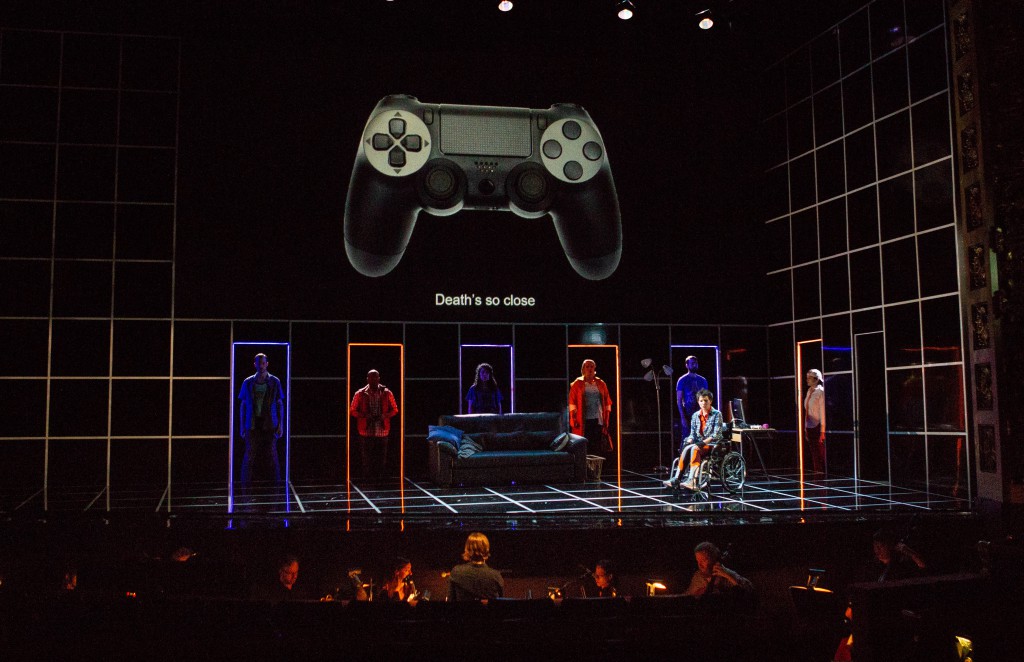“PermaDeath” premiere finds new life in fusion of opera and video gaming

Maggie Finnegan is Sonny in Dan Visconti’s “PermaDeath,” given its world premiere by White Snake Projects Thursday night at the Emerson Cutler Majestic Theatre. Photo: Kathy Wittman
With advancements in technology, video games now have the capacity to engage players in ways that traditional forms of storytelling cannot. The worlds of Halo and online favorites such as The World of Warcraft immerse the player in thrilling adventures while offering stunning landscapes to explore. Game avatars, with their freedom of motion, even become extensions of the self, and death is less an end than a temporary frustration as the player tries to conquer a level or defeat an enemy.
But in Dan Visconti’s PermaDeath, a new opera presented by White Snake Projects in its world premiere Thursday night at the Emerson Cutler Majestic Theatre, game deaths are elevated into the realm of human tragedy.
The story, a mash-up of themes familiar to readers of Ready Player One and The Hunger Games, explores the lengths to which technology can complement human existence. The opera revolves around Sonny, a video game expert who suffers from amyotrophic lateral sclerosis, a degenerative disease that has limited her life and confined her to a wheelchair. Her closest friend is her gaming avatar Apollo, who encourages her to enter the Tournament of Death, a video game competition which will award the winner three million dollars, enough for Sonny to fund her healthcare. The Tournament, however, has one caveat: if the avatar dies, they die permanently.
Cerise Jacobs’ slick libretto tells a convincing and engaging tale of friendship and loss through eight scenes that span one hundred minutes. Sonny’s frustration and fear are laid bare as she finally decides to enter the tournament. The avatars, all taken from Greek mythology, also seem doomed to live troubled lives. Though they are capable of regenerating after dying in a game, they experience all too poignantly the pain of each death. Together, they wonder what PermaDeath will bring in the final tournament, which they enter reluctantly but bravely to fight one another.
In telling the story, Jacobs makes occasional use of off-color jokes and profanity that never come across as gratuitous. A few of the metaphors, though, were forced and ineffective, as in Sonny’s final aria, “In a crap shoot, the toilet always wins/ Why is the toilet water so cold?”
Visconti’s music, however, makes up for such textual deficiencies. His score blends ear-tingling sonorities associated with avant-garde music with rock and folk influences. Through sparse textures, thorny dissonances, and driving rhythms that would be at home in a jug band jamboree, Visconti weaves musical tapestries that are equal parts Webern, Morton Feldman, and Blind Lemon Jefferson.
The music to PermaDeath is also sweeping and intimate. Melodies are broad and seem to unfold endlessly, occasionally breaking out into bluesy strains and cha-cha rhythms. As a whole, the themes have the impact and direct emotional appeal of a film or video game score—an apt fit for such an operatic project.
The singers in Thursday’s premiere were consistently excellent.
As Sonny, Maggie Finnegan sang with a soft but nimble coloratura that floated effortlessly in her plaintive cry in the final scene, where she sacrifices her life to save Apollo. Finnegan’s acting made Sonny an especially sympathetic figure as she struggled with her disease and over the fear of losing her friend.
Josh Quinn was Apollo, and he brought out the character’s warm humanity with smooth tone and searching lyricism. Quinn milked the laughs in his scene with Aphrodite, played by Shirin Eskandani, where both avatars mourned Adonis’ death while dragging his body across the stage and weeping melodramatically. Eskandani sang the role of Aphrodite with radiant voice, and Sarah Coit, as Adonis, projected a bold stage and vocal presence.
In the role of Marsyas, Christopher Carbin’s dark baritone made the most of the brooding character in his deadly fight with Apollo. As Artemis, Amy Shoremount-Obra delivered her lines with velvety tone and delicacy. Stephen Carroll rounded out the gender-swapped cast in the role of Niobe, his clear, ringing tenor giving voice to the character’s vengeance.
The vocal standout was Patrick Dailey, whose countertenor proved a fine fit to the avatar boar called MiniB. Though a sly and awkward character, Dailey’s performance mined the tender sadness from the opera’s ending, when MiniB cuddles with the body of the slain Artemis.
Visconti scored the accompaniment for a chamber ensemble of strings, winds, electric guitar, and toy piano. With brisk, waving gestures, conductor Daniela Candillari drew playing that was finely attuned to nuances while shading passages with subtle dynamics and rubato.
Sam Helfrich’s direction relied on park-and-bark staging, but the video game sequences, which were played on a large overhead screen, added ample energy and excitement. The avatars on screen made for heroic figures, each having the sleek, trim look familiar to anyone who has spent time playing role-playing games.
For the live characters, the costumes were simple but effective. Singers were dressed in shiny vests, t-shirts bearing the Atari symbol, baseball hats turned backwards, and skinny jeans. The minimal set pieces—couch, desk, computer, and neon grid patterns on the walls—cast a high-tech and futuristic scene fit for this first-ever video game opera. Hopefully, this eclectic mix of old and new art forms will yield similarly intriguing future projects.
PermaDeath runs through Saturday at the Emerson Cutler Majestic Theatre. whitesnakeprojects.org
Posted in Performances




